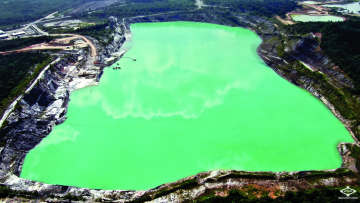Activists call on Japanese banks to stop funding coal miner Adaro
Camilla Perotti, Banks and Coal Campaigner, BankTrack

Camilla Perotti, Banks and Coal Campaigner, BankTrack
-
Indonesia’s second-largest coal company, Adaro, which claimed to use its profit boom to lead Indonesia’s green shift, is continuing to raise funding for coal expansion.
-
Over 58,000 people have called on banks to break ties with Adaro and stop funding its coal expansion.
-
Activists in Tokyo demonstrated outside the National Diet Building in Tokyo to demand that MUFG, SMBC and Mizuho banks stop funding coal expansion projects.
BankTrack, Eko, Market Forces, Kiko Network, and Toxic Bonds Network are calling on Mizuho, MUFG and SMBC to stop facilitating any new bonds issued by Adaro - Indonesia’s second largest coal mining company.
This morning, activists demonstrated outside the National Diet Building in Tokyo, stating “Stop financing Adaro”, “Our house is on fire #EndCoalFinance Now”.
Research by a variety of analysts and organisations shows that there is continued fossil fuel support from the Japanese financial industry. This is enabled by loose policies or loopholes. Japanese banks MUFG, Mizuho and SMBC accounted for more than 10% of all fossil fuel financing made by the world’s top 60 banks from 2016 to 2023, according to the Banking on Climate Chaos 2024. BankTrack’s January 2024 Coal Havens report also finds that major Asian banks, including Mizuho, SMBC and MUFG, are the global hotspots of the coal industry’s growth.
In fact, MUFG Securities Asia (Singapore) was a former underwriter of the Adaro USD 750 million bond due to mature on October 31. MUFG has enabled a total of USD 125.91 million to Adaro through corporate loans and underwriting services from 2016-2023, according to Banking on Climate Chaos 2024.
SMBC is one of Adaro’s existing financiers with an outstanding loan of USD 400 million. Mizuho has also supported Adaro previously through a USD 207 million corporate loan. This demonstrates that Japanese banks are fueling a coal expansion in complete contradiction with global climate goals.
Over 70% of Adaro’s revenue comes from thermal coal (GCEL). Acknowledging the need for transition, Adaro has promised banks that it will cease dependence on coal. But the company has neither announced an absolute thermal coal reduction target nor a complete exit from coal. In fact, it plans to expand metallurgical coal production by restarting and expanding operations at existing coal mines in Indonesia and Australia. Although Japanese banks have taken steps to restrict finance for thermal coal, their policies on met coal are incomplete or absent. A lack of commitments from MUFG, SMBC and Mizuho allows coal miners like Adaro to receive sustained financial support to continue its climate-wrecking coal expansion.
“Banks must see through Adaro's greenwashing. Adaro's true agenda is clear: expand coal production at the expense of the environment and human rights. Japanese megabanks Mizuho, MUFG, and SMBC must stop funding a company actively driving us towards climate chaos. Coal finance should have ended long ago,” Camilla Perotti, Climate Campaigner at BankTrack, said.
“It’s laughable to commit to a green transition and continue to expand coal. As long as banks are enabling financing for companies like Adaro with massive coal expansion plans, they are facilitating climate destruction. Banks must exit coal for good," Apekshita Varshney, Climate Finance Campaigner at Eko, said.
“It's time Japan's big banks, MUFG, Mizuho and SMBC end finance for expanding coal production in countries like Indonesia and Australia in line with global climate goals. Any funding of coal mining and coal power plants will make climate change worse and hinder the chance of limiting global warming to a safer level," said Eri Watanabe, Japan Energy Finance Campaigner at Market Forces.
“It is a sad reality that Japanese banks are providing significant support to coal projects in other countries. Japanese three megabanks should not finance to Adaro, which spends money on coal expansion projects in Indonesia. The money should be used for ‘true’ transitions, expansion of renewable sustainable energy.” Yasuko Suzuki, Program Coordinator at Kiko Network, said.

